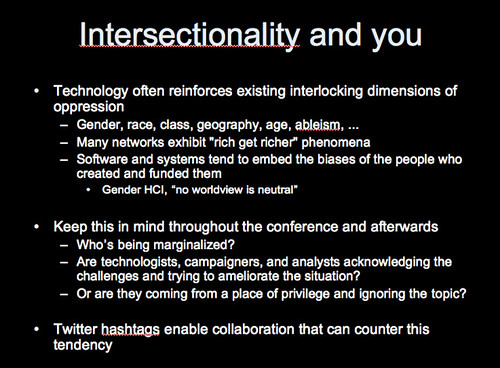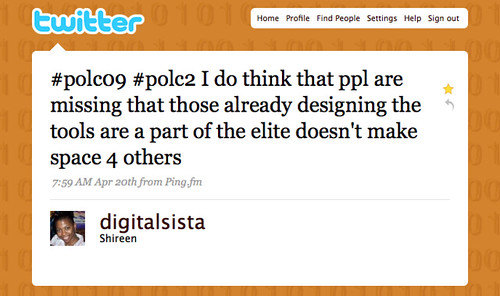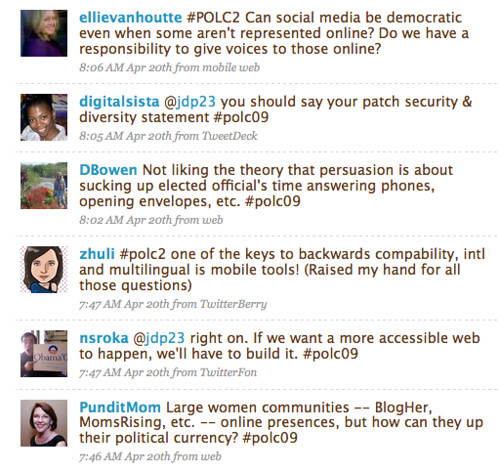
Opening slide from early draft of Hashtags at #polc09
Politics Online (1, 2) was a great conference, at least from my perspective. Starting with the opening session by Secretaries of State Debra Bowen and Jennifer Brunner, every session I went to had great content.  It was a wonderful opportunity to meet friends and colleagues in-person, many for the first time,* and to be on a panel with people like Judith Donath and Clive Thompson.  And of course was also a good chance to continue the Twitter *is* a strategy debate and explore progressives’ bizarre resistance to embrace social network activism; more on that soon.
First, though, I’d like to follow up on the experiment in cognitive evolution and revolution I kicked off in the opening panel.
On hashtags and diversity
Jill Miller Zimon’s live blog is an excellent summary of the opening panel. The topic was how the technologies we use shape our thinking — and what impact this has for political organizing online. All the panelists are doing interesting work here and had interesting things to say, and so I hope they’ll accept my apologies for not doing them justice … and that they’ll take the opportunity to blog about the session!
With only a few minutes to speak, I decided to talk about Twitter hashtags … and to invite attendees to experiment with evolving their consciousness in a revolutionary way. My presentation’s available on the #p2 wiki, along with a chunk of references.
In retrospect, I probably should have been more explicit about what this had to do with cognitive evolution. Like wikis and my.barackobama.com, Twitter hashtags are hard to wrap your head around. They’re simultaneously a mechanism for collaboration, a communication channel, name for a campaign, word in an emerging language, tribe (in the Seth Godin sense of the word), and a lot more.  To fully take advantage of their potential, you need to evolve your thinking; and the more deeply you get into them, the more your thinking evolves. So it was a great opportunity to give people first-hand experience with cognitive evolution as applied to politics online via the #polc09 hashtag.
More specifically, I chose to focus on diversity. As anybody who’s ever been at a conference where the speakers are overwhelmingly white, mostly male, and dominated by technologists knows, it’s very difficult to have discussions of this issue. While there were some great women speaking at Politics Online, there were also plenty of sessions like “six guys talking about how email is the future” , “four guys talking about advocacy 3D“, and “four other guys talking about fishing for users.” Evolving thinking and using technology to give more voice to perspectives typically marginalized in these discussions would truly be revolutionary.
In Strategies for progressives on Twitter, Tracy Viselli and I proposed using the #p2 hashtag as a way of engaging with communities that have been marginalized by the progressive blogosphere, and early results have been very encouraging. This session seemed like a great opportunity to continue the experimentation with a different hashtag.
#diversityfail

The next fifty minutes of the session were filled classic examples of marginalization. Like @JillMZ pointed out on Twitter, people largely vanished from the discussion partway through as the overwhelmingly white, overwhelmingly male panel shifted to technology triumphalism … and the usual privileged and techie-elitist perspectives emerged:
- APIs and access to data change everything!
- The barriers to writing your own application are so low anybody can do it!
- It doesn’t matter if technologists ignore issues like class and ableism because if there are underserved niches somebody will fill them!
etc. etc.
Y’know, I’ve seen it enough times that I shouldn’t be shocked … but as always I was. In response to the “somebody will fill the niches” I asked for a show of hands: how many people in the audience emphasized access for people without computers, non-native English speakers, people with disabilities?
Each time only a few hands went up.*
At this point the data-driven guys I was debating with all said “Wow, Jon, you’re right, thanks for calling it to our attention! This is something I personally need to be paying more attention to … and I will!”
Just kidding.
The actual response was the hoary chestnut: “well, as long as there’s one application that addresses these issues, that’s enough.” Because, you know, having a broad array of tools to choose from the way all of the panelists do isn’t an advantage that should be shared with others. Or something like that. Sigh.
So while there were plenty of interesting things being said, the panel discussion was a classic #diversityfail.
Meanwhile, on #polc09 …
At the same time, on the Twitter backchannel, there was a very different conversation happening involving much more diverse perspectives.
Here are some excerpts:

Hmm.
It sure looks to me that by evolving our thinking and focusing on a Twitter hashtag, we were able to give more voice to perspectives being marginalized in the discussion in the room. And in my closing statement, I wove together @jillmz and @digitalsista’s points from Twitter as well as my own observations — a great example of how hashtags can indeed enable collaboration that countered the matrix of oppressions … just like I said in my opening slide!
So no doubt at this point the data-driven guys I’ve been debating with will all say “Wow, Jon, you’re right, thanks for calling it to our attention! Use of Twitter hashtags can counter these kinds of dynamics, just as you and Tracy suggested! And I guess that means we should try to understand your view that Twitter is a strategy rather than mocking it!”
A guy can dream, can’t he?
But wait, there’s more
And this was just the opening panel of Politics Online! #polc09 remained a valuable backchannel throughout the conference and is now shifting focus to include community building and information dissemination. Diversity issues came up again in Jen Nedeau’s session on old media paradigms shifting to a new media world. And Twitter was a major focus at the conference, including a Golden Dot for Twitter Vote Report and the great panel moderated by @arimelber featuring @clairecmc @timryan @cathymcmorris and @repsteveisrael (for more, see the CSPAN video and the live blog, once again by Ohio political blogger extraordinaire, Jill Miller Zimon on Writes Like She Talks ).
One of the topics that came up a lot was conservative leadership on Twitter — how real it is, why progressives are going to do about it. I got some great insights here from Patrick Ruffini, Soren Dayton and others I don’t usually get to talk with. It was also a chance to get perspectives on Get FISA Right and Facebook activism from different folks, including Sam Graham-Felsen, Bob Fertik, and Ari Melber.
So there’s much more to talk about. Continued in the comments!
jon
* I hope I was complimentary enough to those willing to tackle these tough issues!
 But lately, I’ve been noticing an interesting trend of hashtag usage that’s got me thinking about the possibilities of the form again. This weekend, for instance, you may have noticed #NotYourAsianSidekick bubbling up in your feed (especially if you follow a sizeable number of people who aren’t straight white men). It was the top trend in the U.S. for much of Sunday, started by writer and activist Suey Park to crowdsource messages about stereotyping and the Asian-American experience. Sample tweets from the nearly 50,000 messages with the tag in just over 24 hours: “The clothes I wear to weddings aren’t for you to wear on Halloween #NotYourAsianSidekick” and “#NotYourAsianSidekick because I don’t co-sign the anti-blackness implied when we’re propped up as the ‘model minority.’” Anyone who’s ever dismissed the possibility of serious discussion on Twitter would have to admit: That’s some real talk. Salon said the tag “ignite[d] massive conversation about race, stereotypes and feminism,” and Park’s campaign was covered by the BBC, The Washington Post, The Guardian, and Al Jazeera, among many others.
But lately, I’ve been noticing an interesting trend of hashtag usage that’s got me thinking about the possibilities of the form again. This weekend, for instance, you may have noticed #NotYourAsianSidekick bubbling up in your feed (especially if you follow a sizeable number of people who aren’t straight white men). It was the top trend in the U.S. for much of Sunday, started by writer and activist Suey Park to crowdsource messages about stereotyping and the Asian-American experience. Sample tweets from the nearly 50,000 messages with the tag in just over 24 hours: “The clothes I wear to weddings aren’t for you to wear on Halloween #NotYourAsianSidekick” and “#NotYourAsianSidekick because I don’t co-sign the anti-blackness implied when we’re propped up as the ‘model minority.’” Anyone who’s ever dismissed the possibility of serious discussion on Twitter would have to admit: That’s some real talk. Salon said the tag “ignite[d] massive conversation about race, stereotypes and feminism,” and Park’s campaign was covered by the BBC, The Washington Post, The Guardian, and Al Jazeera, among many others. In the discussion of Twitter feminism, the deployed language of “toxic” or “polluting” feminism is striking given the desire to reclaim these spaces because they are “toxic” and a blight on Feminism or progressive causes. Just as middle-class whites are returning to neighborhoods, previously abandoned and “left behind” – resulting in environmental hardship – these “crusaders” are now seeking to “clean up” the Internet at the expense of already marginalized voices….
In the discussion of Twitter feminism, the deployed language of “toxic” or “polluting” feminism is striking given the desire to reclaim these spaces because they are “toxic” and a blight on Feminism or progressive causes. Just as middle-class whites are returning to neighborhoods, previously abandoned and “left behind” – resulting in environmental hardship – these “crusaders” are now seeking to “clean up” the Internet at the expense of already marginalized voices…. Aaminah Khan’s
Aaminah Khan’s 



Leave a Reply